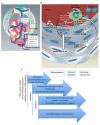Environmental exposures, epigenetics and cardiovascular disease
- PMID: 22669047
- PMCID: PMC3742092
- DOI: 10.1097/MCO.0b013e328354bf5c
Environmental exposures, epigenetics and cardiovascular disease
Abstract
Purpose of review: Epigenetic modifications are heritable alterations of the genome, which can govern gene expression without altering the DNA sequence. The purpose of this review is to render an overview of the possible mechanisms of epigenetic regulation of gene expression in response to environmental pollutants leading to cardiovascular diseases (CVD).
Recent findings: An era of cataloging epigenetic marks of the various diseased states has recently commenced, including those within the genes responsible for atherosclerosis, ischemia, hypertension and heart failure. From varied study approaches directed either toward the general understanding of the key pathway regulatory genes, or sampling population cohorts for global and gene-specific changes, it has been possible to identify several epigenetic signatures of environmental exposure relevant to CVD. Signatures of epigenetic dysregulation can be detected in peripheral blood samples, even within a few hours of environmental exposure. However, the field now faces the demand for thorough, systematic, rationalized approaches to establish the relation of exposure-driven epigenetic changes to clinical outcomes, by using sophisticated and reliable research designs and tools.
Summary: An understanding of chromatin remodelling in response to environmental stimuli conducive to CVD is emerging, with the promise of novel diagnostic and therapeutic candidates.
Figures


References
Publication types
MeSH terms
Substances
Grants and funding
LinkOut - more resources
Full Text Sources
Research Materials

